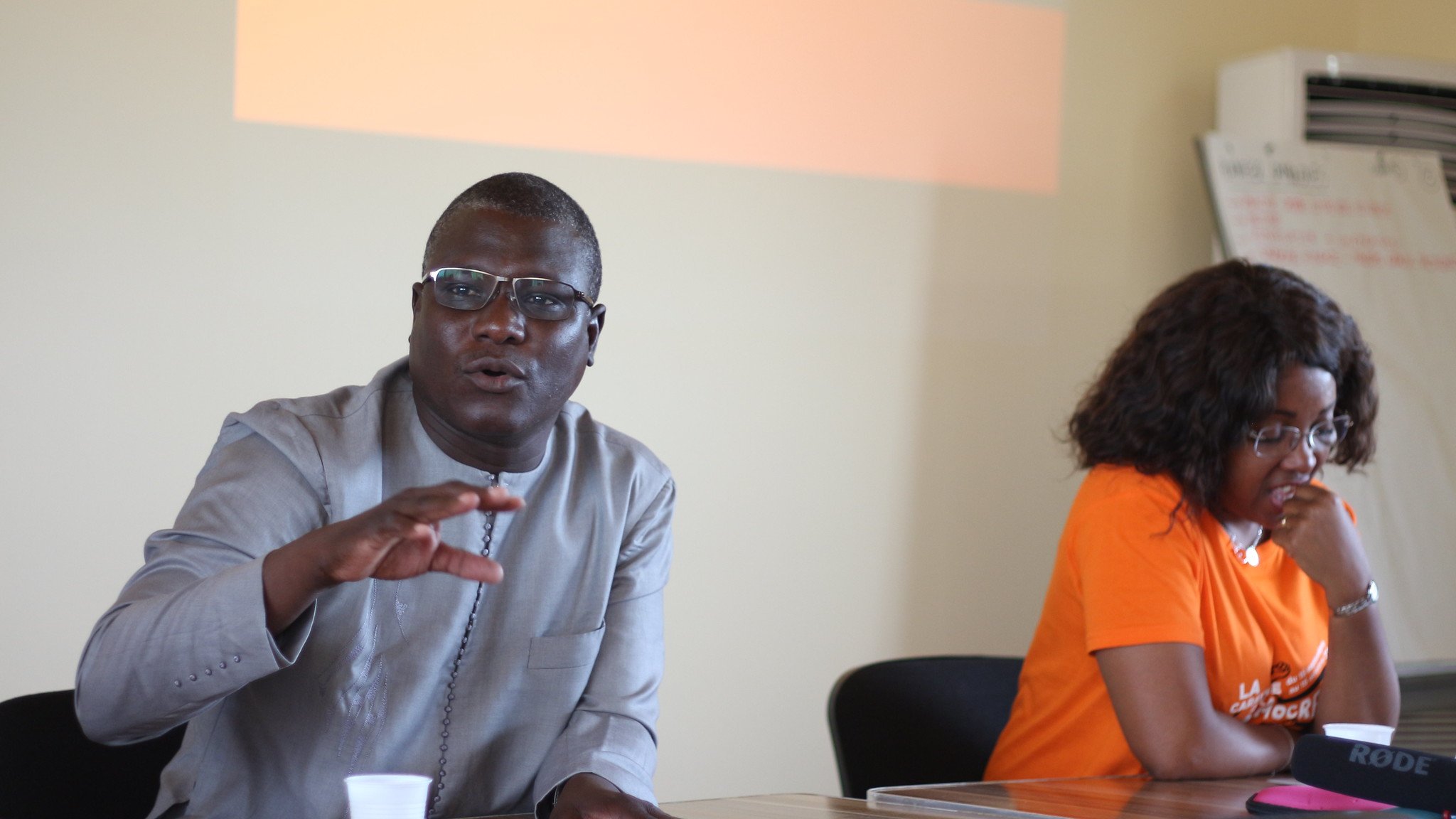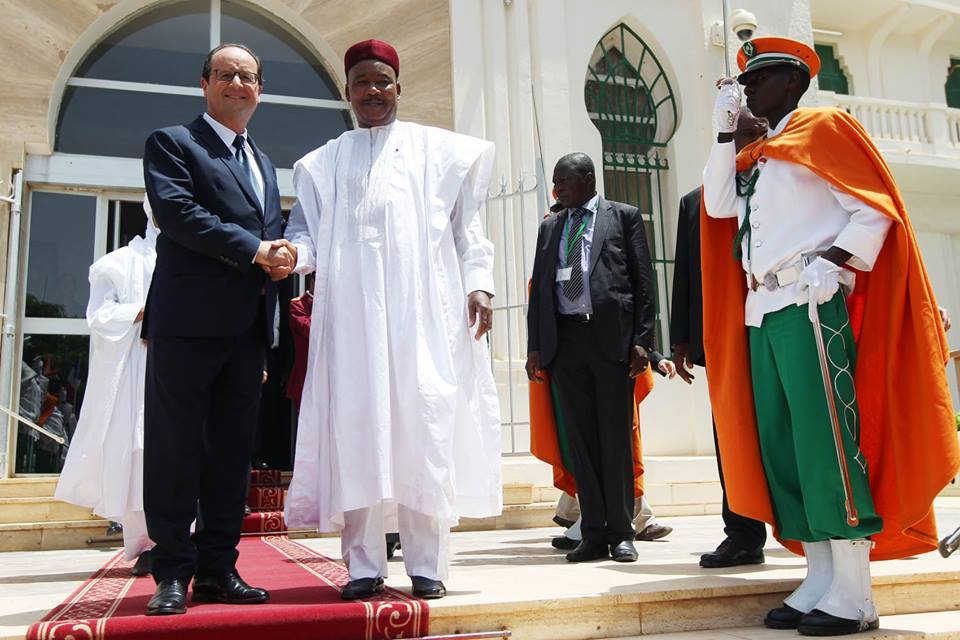
Ali Idrissa is a leading figure in Niger’s civil society. He has fought almost every battle : for human rights and democracy, against the high cost of living and corruption... And he has paid a heavy price. On several occasions under Mahamadou Issoufou’s regime (2011-2021), he spent many hours in police custody. He was even imprisoned for more than four months in 2018 for organising a demonstration against the finance bill, which included new taxes for low-income households. But his first arrest was ‘due’ to his stance on uranium mining by Areva (now Orano) in northern Niger.
This was in July 2014, during the visit of French President François Hollande to Niamey. Along with other activists, they had planned to dress in yellow, the colour of ‘yellow cake’ (the name given to uranium), and demonstrate against ‘the pillage [of] natural resources’ by the French multinational. But they didn’t have the time: they were all arrested at dawn, a few hours before the French president’s plane landed at Niamey airport. They were held in a police station for most of the day, while the French delegation left the country.
Ali Idrissa began his activism at secondary school in the early 1990s, first fighting for human rights, then against the high cost of living, before taking an interest in natural resources, and in particular uranium mining, in the mid-2000s. In 2006, he launched the Réseau des organisations pour la transparence et l’analyse budgétaire (Rotab) and joined ‘Publish What You Pay’campaign. The aim was to promote transparency in the extractive industries in Niger, particularly in the uranium sector. A few years later, in 2017, he took part in the creation of the ‘Tournons La Page’ coalition in Niger, of which he is an influential member.
‘For us, Areva is France’
Rémi Carayol: What does uranium mean to the people of Niger ?
Ali Idrissa : For a long time, the people of Niger didn’t feel concerned by this issue, they thought it was far away, they didn’t see anything concrete in connection with uranium, and they didn’t benefit from it. It was a resource that benefited France, full stop. But over the years, they became interested. Today, uranium is synonymous with injustice. It brings to mind the notion of the curse of resources. We have uranium, a highly sought-after mineral, but we are at the bottom of the world in terms of development…
Rémi Carayol: What do they think of Areva, now Orano ?
Ali Idrissa : Areva is the company that is robbing us, polluting our groundwater, monopolising our resources and preventing us from benefiting from them. It doesn’t have a good reputation here. But for us, Areva is France, there’s no difference.
Rémi Carayol : When and how did you become aware of the issues surrounding uranium mining ?
Ali Idrissa : I first became interested when the international ‘Publish What You Pay’ campaign was launched in 20021. I realised that uranium was a resource and that we had to be concerned about it. Before that, I thought of it as a defence secret. I thought it was mainly used as military material. Thanks to ‘Publish What You Pay’, and then with the launch of the EITI [Extractive Industries Transparency Initiative], I realised that uranium also served civilian interests, and above all that citizens had the right to know how it was being used.
In 2005, I took part in the movement against the high cost of living. Several leaders of the movement were arrested. Then the government released them and agreed to negotiate. It asked civil society to put forward proposals to limit price rises. That’s when we took up the uranium issue. At the time, uranium was our main natural resource: we were not yet producing oil. We decided to call on ‘Publish What You Pay’ : we contacted the African coordination, which was based in Cameroon. After that, we set up Rotab.
‘Uranium is not just a military issue’
Rémi Carayol : What are the aims of ‘Publish What You Pay’ ?
Ali Idrissa : Quite simply, to ask companies to publish their income. To demand transparency. And to help governments, in this case the government of Niger, to join the EITI.
Rémi Carayol : And what are Rotab’s objectives ?
Ali Idrissa : To make the people of Niger understand that uranium is not just a strategic or military issue, to convince them that it is a national issue and that the people must have a say in it, and finally to work to ensure that Niger really benefits from it. Our aim was not to fight Areva or France, but simply to ensure that the country’s natural resources were distributed fairly.
Rémi Carayol : How were you received by Areva management and the Niger authorities ?
Ali Idrissa : At first, relations were difficult. We were seen as being in the way, not as potential partners. They ignored us. But over time, we managed to build a dialogue. Areva understood that we weren’t enemies from the outset.
There have been moments of tension, of course. In 2008-2009, at the time of the ‘tazartché’, when [President Mamadou] Tandja wanted to hold on to power, there were arrests and threats against our organisations. In 2013-2014 too, at the time of the renewal of the contract between Niger and Areva. We called for the application of the 2006 law, which provided for an increase in the mining royalty - from 5.5 % to 12 % - the ‘Nigerisation’ of management positions, and regulations for subcontractors, in particular giving preference to local companies. For its part, Areva took advantage of the defence agreements signed with Niger in the 1960s, which guaranteed stability for 75 years. And all with the blessing of the government. We only understood a few years later, with the revelation of ‘uraniumgate’, why the government was supporting Areva’s position against the interests of the people of Niger.

Rémi Carayol : That’s when you were arrested in 2014...
Ali Idrissa : Yes, they came to arrest me and several comrades at our home at 5 o’clock in the morning. We had planned to demonstrate on the route of President Hollande’s convoy. We were to dress in yellow and hold up placards with the slogan : ‘Don’t touch my uranium’. Quite simply, we wanted Areva to respect Nigerian law. This law was never applied. Areva, now Orano, has never complied.
‘Everything was done behind the backs of the people of Niger’
Rémi Carayol : Did Areva’s management try to convince or even coax you ?
Ali Idrissa : Of course. The members of ‘Publish What You Pay’ and I were invited to Areva headquarters in Paris. We were received by management: there was Anne Lauvergeon [chairwoman of Areva’s management board from 2001 to 2011], Sébastien de Montessus [then director of uranium extraction and enrichment] and Emmanuel Macron’s former prime minister [from 2017 to 2020], Edouard Philippe [then director of public affairs]. We were received at the Ministry of Defence and at the Élysée Palace too, by an adviser to Nicolas Sarkozy [president from 2007 to 2012]. We weren’t alone, there were Gabonese people there too. They told us that they respected the laws of our country, that they were open to dialogue with civil society, but they stuck to their guns.
Rémi Carayol : Are people still talking about ‘uraniumgate’ in Niger? What does this affair mean to you ?
Ali Idrissa : Nigeriens haven’t forgotten it. It’s probably the biggest scandal in our country’s history, along with ‘MDN Gate’2 - a scandal that was never brought to trial. It illustrates the ambiguous relationship between our leaders and the leaders of Areva: everything was done behind the backs of the people of Niger, for interests that are still unknown. Each party has made concessions, but it is the people of Niger who are paying the price. It’s worth remembering that Mahamadou Issoufou, before becoming president, worked at Somaïr [at the end of the 1980s].
‘Uraniumgate’ sums up the scam surrounding uranium mining in Niger. But, more broadly, uranium symbolises for us the history of relations between France and Niger: you need France’s agreement to run things. In fact, for many Nigeriens, Areva decides the fate of heads of state. Many are convinced that if [Hamani] Diori fell [in 1974], it was because of uranium.
Rémi Carayol : What are you waiting for today : Orano to be more transparent, or simply to leave the country ?
Ali Idrissa : All we want is for Orano to respect the country’s laws and regulations governing the exploitation of natural resources, and to assume its social and environmental responsibilities. But we’re not asking it to leave, we’re not trying to drive it out. We simply want Orano to have no exclusivity, and for everyone to be treated equally: the Chinese, the Russians, the Turks... And we want the people of Niger to finally benefit from this.
Rémi Carayol : Do you fear a hasty departure in view of the current tensions between Paris and Niamey ? The government has withdrawn the concession for the Imouraren site that Areva obtained in 2009...
Ali Idrissa : If there are tensions, it’s because of France. It was France that mismanaged the crisis after the coup [in July 2023]. But I don’t think it will go as far as Orano leaving, because it’s in the interests of both parties to continue operating. As far as Imouraren is concerned, Areva undertook to start production in 2012. Here we are in 2024, and nothing has started. They wanted to play a delaying tactic to keep this mine as a reserve for the future.
If you believe in the importance of open and independent journalism :

1‘Publish What You Pay’ is a global network of civil society organisations working for transparency and accountability in the extractive industries. Created in 2002, it has over 700 member organisations worldwide.
2The ‘MDN Gate’ is a scandal involving the government and the army, involving the embezzlement of nearly 76 billion CFA francs (currently around 116 million euros). In February 2020, an audit of Niger’s Ministry of Defence, reported in the press, revealed that billions of CFA francs had been embezzled between 2017 and 2019 within this institution, in connection with the award of various public contracts. The audit refers to false orders, real orders for defective and unusable equipment, imaginary maintenance services and overbilling in the purchase of equipment for the army, and names various people close to the ruling party, the Parti nigérien pour la démocratie et le socialisme (PNDS).